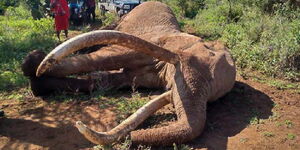Rick Wiles, an American pastor at Flowing Streams Church in Vero Beach, Florida stated that the locusts menace in Kenya was God's punishment.
Speaking to Trunews, a Dallas-based Christian website, Wiles recalled a time he was forced to pay a bribe while doing charity work in Kenya.
The insects crossed into Kenya through El Wak from the Southern side of Somalia on December 28, 2019.
“I had sent well-drilling rigs to Kenya where they are dying of thirst and I was trying to dig wells to give water to them. At the port of Mombasa, I was told I had to pay a Ksh8 million charity tax, it was sad,” he stated.
In addition, Wiles stated that Kenya was the most corrupt country, hence, attracting punishment from God.
"There are stages of judgment and Kenya has had a drought. Now it’s going into famine. God sends punishments in different ways. I’m not surprised that there are locusts swarms in Kenya right now," he remarked.
Further, he stated that the locusts would eat all farm produce as a form of punishment to Kenyans.
The 69-year-old went ahead and compared the locust situation in Kenya to the Coronavirus outbreak in China, adding that God was punishing sinful nations.
Wiles stated that the virus had affected the country because of the “godless communist government that persecutes Christians” and “forced abortions”.
“When we choose not to bend our knees, then the Lord cranks up the pressure. Look at what’s happening in Kenya and what’s happening to America, It’s also what’s happening in China,” he stated.
On Monday, January 24, Farhan Haq, the deputy spokesman for UN Secretary-General Antonio Guterres stated that the locust menace was the worst Kenya had seen in 70 years.
"It is the worst of its kind in 25 years for Ethiopia and Somalia and the worst Kenya has seen in 70 years.
"Crops are being wiped out in communities that were already facing food shortages. The outbreak is exacerbating the impacts of climate change already being felt in this region," he stated.
As it stands, the swarms in Kenya have already begun breeding with the new generation expected to mature in April in the northern counties.
The government's best bet is to wipe out the eggs before they hatch. Alternatively, Kenya's last recourse would be to wait out the current rainy season that favours the swarms. Once dry conditions set in, the locusts have been known to eat each other as food sources become scarce.












